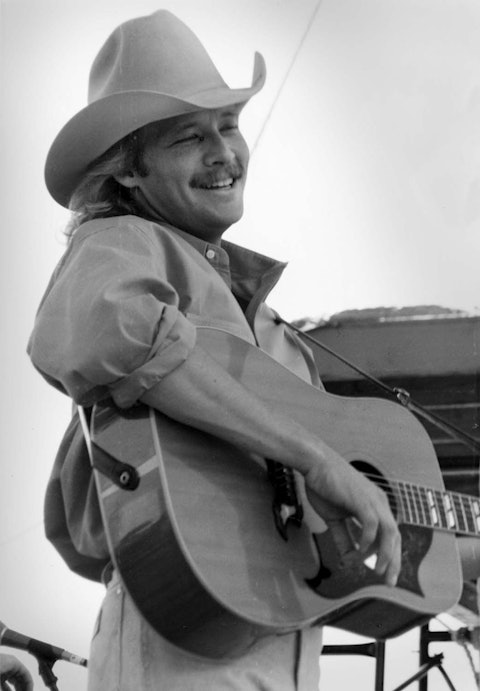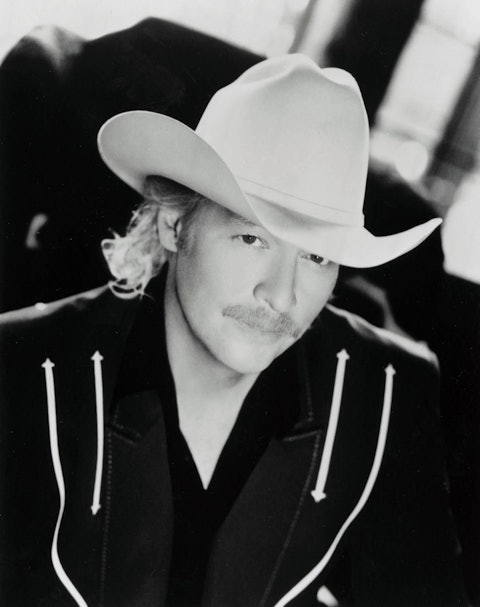Alan
Jackson

-
Inducted2017
-
Born
October 17, 1958
-
Birthplace
Newnan, Georgia
Georgia Roots, Nashville Ambitions
As a songwriter, recording artist, and performer, Alan Eugene Jackson brought tradition-rich country music into the twenty-first century. He built a multi-platinum-selling, award-winning career while holding fast to country traditions while many of his contemporaries embraced pop and rock influences. A three-time Country Music Association Entertainer of the Year and a Grand Ole Opry member since 1991, he has sold more than sixty million albums worldwide and released twenty-six Billboard #1 country singles, most of which he wrote or co-wrote. His often-autobiographical songs are marked by humility, humor, and eloquent simplicity.
A Georgia native, Jackson moved to Nashville in the mid-1980s. He worked in the mailroom of the Nashville Network and as a demo singer while he honed his songwriting skills.
Jackson was the first artist signed to the Arista Nashville record label. In 1990, Arista released his debut album, Here in the Real World, which yielded four Top Five singles: the title track, “Wanted,” “Chasin’ That Neon Rainbow,” and “I’d Love You All Over Again.”
Songs
00:00 / 00:00
00:00 / 00:00
00:00 / 00:00
Keeping It Country
Throughout his recording career, Jackson has abided by a simple edict: “Keep it country.” He has taken pokes at the music industry, penning “Three Minute Positive Not Too Country Up-Tempo Love Song” and recording hits such as “Gone Country” and “Murder on Music Row,” a CMA award-winning duet with George Strait. In the 1990s, he collaborated with another young traditionalist, Randy Travis, co-writing several hit singles: “Forever Together,” “Better Class of Losers,” “I’d Surrender All,” and “She’s Got the Rhythm (and I Got the Blues)”—the first three recorded by Travis, the last recorded by Jackson.
Jackson has also revived songs recorded by Country Music Hall of Fame members Jim Ed Brown (“Pop a Top”), Tom T. Hall (“Little Bitty”), George Jones (“Tall, Tall Trees”), and Don Williams (“It Must Be Love”). In fact, Jackson recorded an entire album of covers of classic country songs, titled Under the Influence, in 1999, with faithful remakes of hits by Charley Pride, Hank Williams Jr., Merle Haggard, and more. As part of his commitment to traditional country sounds, Jackson has recorded albums of gospel songs (Precious Memories (2005) and Precious Memories Volume II (2013)) and bluegrass music (The Bluegrass Album, 2013).
As a songwriter, Jackson’s gems include “Chasin’ That Neon Rainbow,” “Drive (For Daddy Gene),” “Livin’ on Love,” and “Remember When,” all of which mined personal experience in communicating communal truths.
Photo Gallery
-

Alan Jackson at Fan Fair in Nashville, June 1990.
-

Alan Jackson, early 1990s. Photo by Russ Harrington.
-

Alan Jackson, 1994.
-

Alan Jackson performs wearing a Don Williams T-shirt, 1995. Photo by Raeanne Rubenstein.
-

Alan Jackson, 1995. Photo by Raeanne Rubenstein.
-

Alan Jackson, 2000. Photo by Raeanne Rubenstein.
Throughout his recording career, Alan Jackson has abided by a simple edict: “Keep it country.”
Career Honors
Jackson’s poignant and plainspoken “Where Were You (When the World Stopped Turning),” written after the terrorist attacks of September 11, 2001, won a Grammy for Best Country Song. The CMA and the Academy of Country Music both named it Song of the Year and Single of the Year. Jackson won his second Grammy in 2011 when “As She’s Walking Away,” a Zac Brown Band hit that he sang on, was named Best Country Collaboration with Vocals.
In 2014, Jackson was named the Country Music Hall of Fame and Museum’s twelfth annual artist-in-residence; the residency honors a musical master who has contributed a large and significant body of work to the American popular music canon. The same year, the museum opened the exhibit Alan Jackson: 25 Years of Keepin’ It Country. Also in 2014, performing rights organization ASCAP presented Jackson with its Heritage Award, recognizing him as its most-performed country music songwriter-artist of the past hundred years.
In addition to his 2017 induction into the Country Music Hall of Fame, Jackson was elected to the Nashville Songwriters Hall of Fame in 2011 and the Songwriters Hall of Fame in 2018.
— Janet E. Williams
Adapted from the Country Music Hall of Fame® and Museum’s Encyclopedia of Country Music, published by Oxford University Press
Videos
“Gone Country” music video
1994
“Little Bitty” music video
1996



